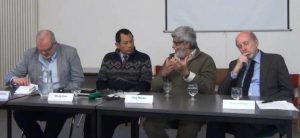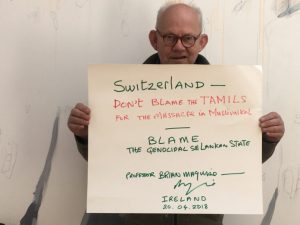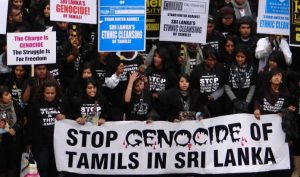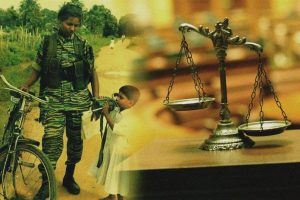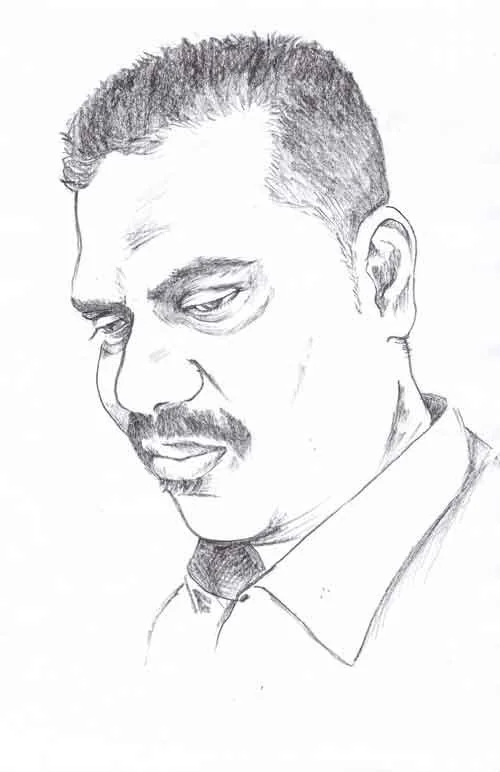
Resistance to genocide is not a crime!
The International Human Rights Association Bremen (IMRV) is launching a major political campaign in support of Eelam Tamil activist Nathan Thambi, who is currently facing criminal charges in Germany for financially supporting the Liberation Tigers of Tamil Eelam (LTTE). The German authorities demanded that Nathan pay a fine as punishment for this ‘crime’. Nathan refuses to pay the fine, as to do so would mean legitimising the European Union’s (EU) designation of the LTTE as a terrorist organisation. The IMRV fully supports Nathan’s stand for justice.
The charge against Nathan is that he collected money to be sent to his homeland between the years 2006 and 2009. In fact, he started before 2006. Between 2002 and 2006, during the internationally mediated peace process, he, like hundreds of thousands of Diaspora-Tamils, collected and sent money to the LTTE administered Vanni. During this period of peace, non-Tamils joined with the Tamil Diaspora to help rebuild the war ravaged north and east of the island, with the participation hundreds of church organisations, non-governmental organisations, governmental bodies and supra-national entities like the Asian Development Bank. Hundreds of millions of Euros were sent, generally to the North and East, areas of the island where the people supported the LTTE and specifically to the Vanni which was directly administered by the LTTE. The peace dividend benefitted the Sinhala majority south too, even more that the population in the north and east, making the peace process a truly win-win situation – at least for population in the island.
So, it is clear that during this period – 2002 till 2006 Nathan was not alone in collecting money to send to his brothers and sisters in his homeland. But in June 2006 the EU banned the LTTE, criminalising Nathan and everyone else who sent help to the LTTE controlled Vanni. You might think, ah… the war started in 2006, that must have something to do with the why the LTTE was banned. You would be wrong, because the LTTE was banned and Nathan and all those we listed above were criminalised before the war started – in the middle of the peace process. In fact, as we will explain below, it is not the war that caused the LTTE ban, rather it was the ban that triggered the war.
EU’s peace gambit
After the second world war, the policy of the western alliance towards Sri Lanka was determined by the its former colonial ruler the UK and the rapidly rising USA. For the US/UK alliance, Sri Lanka’s value was determined by the military significance of its strategic location (see here). During the period of the cold-war, the EU broadly followed UK/US policy on Sri Lanka, that is to arm and train the Sri Lankan state to militarily crush the Tamil resistance. However, after the fall of the soviet bloc, with their common enemy gone, the western policy alignment began to disintegrate with the EU openly taking a stand against US policy. The EU adopted more independent and critical stances as US/UK alliance began to use its military superiority to wage wars and initiate conflicts so that it can gain control of essential raw materials to compensate for the industrial prowess of EU countries like Germany. The 90’s saw the escalation of conflicts and wars in Africa and the Middle-East and at the same time political mobilisation took place against war all over the world – including in the western countries. This peace trend was reflected even within the UN leadership. By the end of the 90’s, Germany in particular, with a government that had come into power through an anti-Iraq war ticket, was actively promoting through the EU, practical interventions aimed at ‘conflict transformation’, with the Sri Lankan conflict being their preferred stage (see here).
During the second half of the 90’s the military conflict between the Sri Lankan armed forces and the LTTE intensified to a new level – with the LTTE gaining capability to withstand the Sri Lankan forces in conventional warfare. The barely concealed US support for the Sri Lanka’s military was increasing steadily. In June 1996 in an article headlined ‘Green Berets playing role in bloody civil war’ a local Seattle newspaper reported: “Operation: Balanced Style” – comes six years after Sri Lanka was the only Asian nation to offer refuelling bases for U.S. warplanes during the Persian Gulf War (the first US invasion of Iraq). However, ‘Balanced Style’ and other US training programs did not have the desired effect. In 1997, at the point when the LTTE had gained ability to maintain control of Tamil land using conventional warfare, the US included the LTTE in the terror list! This step, using of the ban as a political weapon in the international domain, to criminalise, demonise and politically isolate the Tamil resistance would turn out to be the most powerful weapon in the US’s armour. To start with in 1998, Sri Lankan government, following the US cue, banned the LTTE. This undermined the possibility of peace talks and negotiations. The next few years saw the US and British trained Sri Lankan military, attempt, with a series of all out military offensives, to eliminate the LTTE – but failed to do so. The LTTE counteroffensives – like overrunning the Elephant Pass Army Camp in April 2000, which the US military experts had said was impregnable – undermined the assertion by the Sinhala hardliners and their international backers that a military solution was possible.
An important landmark with the Norwegian diplomacy was reached when in November 2000, their peace facilitator went to the LTTE controlled Vanni to speak with the LTTE leader Velupillai Prabhakaran. It was under these conditions – being conscious of the new developments in the international domain – that the LTTE launched its so-called ‘peace offensive’. On 24th December 2000, it enacted a unilateral cease-fire as an offer to the Government to create an atmosphere that is suitable for peace talks. The government, still under the influence of hard liners – rejected the offer. LTTE maintained the ceasefire unilaterally for 4 months despite losing 160 cadres. In February 2001, during the LTTE’s self-imposed cease-fire, the UK banned the LTTE. The UK government sided with the US and in opposition to the EU’s initiative for a negotiated solution. Buoyed by the UK’s ban, the Sri Lankan armed forces launched the massive operation ‘Agnikeela’ on 25th April 2001, within a few hours of the LTTE ending their unilateral ceasefire. Its main objective was to retake Elephant Pass Garrison which they lost to LTTE one year back. However, LTTE countermeasures stopped the offensive with the Sri Lankan armed forces suffering heavy casualties.
All of this led to a crisis in government and an early election was called for in December 2001. The Sinhala population could not any more believe the hard-liners promises of glorious military victory when they could see defeat after defeat with unbearable costs in terms of lives lost and the economy harmed. Many Sinhala people voted for political parties that supported peace through negotiation. So, the majority of the people in the island voted against the hard-line position of military destruction of the LTTE promoted by the US and UK and in support of negotiations with the Tamil resistance – the position promoted by the German influenced EU.
It was the positive intersection of the conditions within the island and in the international frame that laid the basis for the peace process. The anti-Iraq war Schröder government in Germany pursued a policy to actively support peace. In mid-1999, a report by Stephan Klingebiel, called ‘Impact of development cooperation in conflict situations – cross-section report on evaluations of German development cooperation in six countries’ was distributed to high level decision-makers in Germany. The report concluded that Sri Lanka was the place where Germany’s strategy of promoting peace is most likely to succeed.
German policy on this issue had a resonance within the EU, as its formation, it’s very raison d’être was proclaimed to be stopping world war from recurring. The EU’s endorsement of the position that parity of esteem be accorded to both negotiating parties (the LTTE and Sri Lankan state) and its declared opposition to a military solution, was crucially important for the peace process to officially commence in 2002. The EU’s role in creating an international political space for the peace process was essential to turn the military stalemate forced upon the Sri Lankan government by the Eelam Tamil resistance in the late 90s into a search for a political solution through negotiations.
Such are the complex alliances in international politics that the co-chairs of the peace process (EU, USA, Japan and Norway) included USA (and Britain – the US Trojan horse in the EU) which had a ban on the LTTE and therefore clearly did not support the ‘parity of esteem’ policy of the peace process. Our graphic (link here) will show how the peace process came under systematic attack from the US and how this intensified during the Iraq war in 2003 – when the military possibilities of Trincomalee harbour came into sharp focus, (see here) and how the ban was used as an instrument of breaking the back of the EU position. The coercion of each and every member of the EU to ban the LTTE triumph of US/UK statecraft which crushed the peace gambit of the EU and unleashed the Sri Lanka’s ‘dogs of war’ on the Eelam Tamils.
We will argue that the legal regulation used against Nathan which is ultimately the EU ban on the LTTE. We will argue that this ban was a crime against peace (link here). The ban was put in place – albeit under heavy pressure from the US and UK – with the full knowledge that it would encourage the Sri Lankan government to restart the war. Predictably the war started two months after the ban. The EU doubled down on their new position by extending the ban as Sri Lankan forces continued to escalate its massacres.
Nathan’s simple stand not to pay the fine is a refusal to accept the legitimacy of the EU ban, a rejection of the validity of the legislation that that opened the gates of hell for the Eelam Tamils, and a refusal to collaborate with those who politically used this ban to enable a war which was genocidal in character.
Nathan’s case will be not only fought in the courts – it will be fought intensively in the court of international public opinion. We will show in the internet in great detail how, the peace process, which Nathan, the Tamil Diaspora and the majority of the population in the island – whether Tamil or Sinhalese – wanted, was destroyed.
Nathan’s fight is not only a fight to reclaim the honour of the struggle for Tamil Eelam, but it will also recognise those in Europe like the German cabinet minister Heide Marie Wieczorek-Zeul who fought a principled battle to safeguard the principles of the peace process. A victory for Nathan will strengthen all those who fight for a just peace in the future.
We ask all progressive forces, peace-loving, and humanitarian forces in the world: Can you allow the US and the UK to get away with engineering a genocide, just to get free access to a strategic harbour to project its military power against the Middle East and China? If the answer is no then please contact us and we can surely formulate a way that we can collaborate.
As our fightback will charter new ground, there will be many who will oppose it. Further, the prosecutor in Germany has already warned Nathan that the legal costs of a process like this will be many, many times more than the fine that Nathan has refused to pay. So, we will be under political as well as financial pressures. We need those who agree with us to join the fightback and support us urgently.
Let the Tamil Diaspora’s fightback begin!


